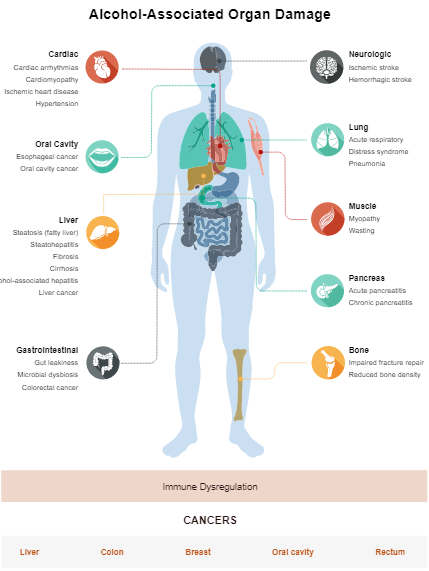Alcohol and Mental Health: Understanding the Connection and Finding Balance
BY: Neighbors’ Consejo|
Alcohol is a common social lubricant and often consumed for relaxation and enjoyment. However, excessive alcohol consumption can have negative effects on both physical and mental health. In particular, the impact of alcohol on mental health is a growing concern. That is why in this article we explore the relationship between alcohol and mental health, the potential risks and benefits of alcohol consumption, and ways to maintain a healthy balance.
To begin with, it is important to ask ourselves why do people consume alcohol? Some reasons are: past experiences, stress, social norm, environment, accessibility, as an act of rebellion, peer pressure and, for fun [1] . “People like to drink alcohol because of its ability to alter emotional states. Alcohol induces euphoria, relaxation, and disinhibition while reducing stress and anxiety [2] .”
According to the Centers for Disease Control and Prevention (CDC [3]) the US standard drink sizes are: 12-ounces of beer (5% alcohol content); 8-ounces of malt liquor (7% alcohol content); 5-ounces of wine (12% alcohol content); 1.5 ounces of 80-proof (40% alcohol content) distilled spirits or liquor (e.g., gin, rum, vodka, whiskey). The same source considers that “excessive drinking includes binge drinking, heavy drinking, and any drinking by pregnant women or people younger than age 21.”
What are the health risks of consuming alcohol [4] ?
| Short-Term Health Risks | Long-Term Health Risks |
| – Injuries, such as motor vehicle crashes, falls, drownings, and burns.Violence, including homicide, suicide, sexual assault, and intimate partner violence. – Alcohol poisoning, a medical emergency that results from high blood alcohol levels. – Risky sexual behaviors, including unprotected sex or sex with multiple partners. – These behaviors can result in unintended pregnancy or sexually transmitted diseases, including HIV. – Miscarriage and stillbirth or fetal alcohol spectrum disorders (FASDs) among pregnant women. | – High blood pressure, heart disease, stroke, liver disease, and digestive problems. – Cancer of the breast, mouth, throat, esophagus, voice box, liver, colon, and rectum. – Weakening of immune system, increasing the chances of getting sick.Learning and memory problems, including dementia and poor school performance. – Mental health problems, including depression and anxiety. – Social problems, including family problems, job-related problems, and unemployment. – Alcohol use disorders, or alcohol dependence. |
To be even more precise, in our body alcohol has some effects such as those indicated in the following graph made by The National Institute on Alcohol Abuse and Alcoholism [5].

On the other hand, Drinkaware [6] is clear about the effects of alcohol on mental health: Alcohol and “hangxiety”, alcohol dependence, alcoholism, alcohol and anxiety, alcohol and suicidal thoughts, alcohol withdrawal symptoms, alcohol and aggression, alcohol and depression, alcohol and stress and, alcohol and dementia. We invite you to visit their website for more details and interaction with it: https://www.drinkaware.co.uk/facts/health-effects-of-alcohol/mental-health.
In conclusion, the relationship between alcohol and mental health is direct and concerning. While moderated alcohol may offer some benefits, excessive drinking can have serious negative consequences for mental and physical health. That is why we invite you to maintain a healthy balance and being aware of the potential risks and always remember that if you need help you can seek professionals for it.
[1]https://www.alcoholandyouni.com/9-reasons-people-drink/#:~:text=People%20generally%20tend%20to%20drink,relax%20and%20have%20more%20fun.
[2]https://www.ncbi.nlm.nih.gov/pmc/articles/PMC2730732/#:~:text=People%20like%20to%20drink%20alcohol,while%20reducing%20stress%20and%20anxiety.
[3]https://www.cdc.gov/alcohol/fact-sheets/alcohol-use.htm#:~:text=High%20blood%20pressure%2C%20heart%20disease,liver%20disease%2C%20and%20digestive%20problems.&text=Cancer%20of%20the%20breast%2C%20mouth,liver%2C%20colon%2C%20and%20rectum.&text=Weakening%20of%20the%20immune%20system%2C%20increasing%20the%20chances%20of%20getting%20sick.&text=Learning%20and%20memory%20problems%2C%20including%20dementia%20and%20poor%20school%20performance.
[4]https://www.cdc.gov/alcohol/fact-sheets/alcohol-use.htm#:~:text=High%20blood%20pressure%2C%20heart%20disease,liver%20disease%2C%20and%20digestive%20problems.&text=Cancer%20of%20the%20breast%2C%20mouth,liver%2C%20colon%2C%20and%20rectum.&text=Weakening%20of%20the%20immune%20system%2C%20increasing%20the%20chances%20of%20getting%20sick.&text=Learning%20and%20memory%20problems%2C%20including%20dementia%20and%20poor%20school%20performance.
[5]https://www.niaaa.nih.gov/alcohols-effects-health/alcohols-effects-body
[6]https://www.drinkaware.co.uk/facts/health-effects-of-alcohol/mental-health

